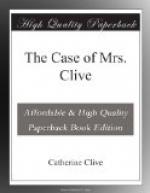The part you have maintained in the present dispute between the players and the patentees, is so full of honour, that had it been in higher life, it would have given you the reputation of the greatest heroine of the age. You looked on the cases of Mr. Highmore and Mrs. Wilks with compassion, nor could any promises or views of interest sway you to desert them; nor have you scrupled any fatigue ... to support the cause of those whom you imagine injured and distressed; and for this you have been so far from endeavouring to exact an exorbitant reward from persons little able to afford it, that I have known you to offer to act for nothing, rather than the patentees should be injured by the dismission of the audience.[8]
Fielding is, of course, referring to the 1733 dispute in which Mrs. Clive (and Macklin) among the principal players stayed with the ineffective proprietor of Drury Lane, John Highmore. Jealous that Highmore and not he gained control of Drury Lane after former shareholders either died or sold out, Theophilus Cibber demanded, among other things, that Highmore share profits with his players rather than pay fixed salaries. He then led the Drury Lane players in revolt in the autumn of 1733 to the New Haymarket where they played without a license until March of the 1733-1734 season, at which time they returned to Drury Lane under the new management of Fleetwood. The actors at least partially won this battle, and although Highmore tried to have the vagrant act enforced, the players returned to Drury Lane unscathed. With Highmore gone, a period of uneasy peace obtained. The players, however, were not to win so easily the next dispute, the one that took place after the passage of the licensing act.[9]
Mrs. Clive’s decision to stay with Highmore rather than defect was probably made because “two women—Mrs. Wilks, the widow of her [Kitty’s] old theatrical idol, and Mrs. Booth—were in he direction of the theater.[10] But in light of Fielding’s words and her actions and statements in regard to the welfare of Drury Lane and its actors throughout her career, I believe that Mrs. Clive, although not pleased with aspects of Highmore’s reign, also refused to defect because she felt that the manager was basically in the right, that her fellow players would be destitute or at least open to hardship without employment there, and that the audiences would take offense at such unprofessional and selfish behavior from their “servants.” The “Town,” as her own play The Rehearsal (I.i. 159-170) shows, was always her judge in matters professional.
Fielding’s prologue to his revised Author’s Farce (1734), spoken by Mrs. Clive, compares the settled, prosperous former days at Drury Lane with those of 1734, when “... alas! how alter’d is our Case!/ I view with Tears this poor deserted Place."[11] With few exceptions, the “place” continued strangely in decline even with a competent company and often with a full house. The falling-off continued until the advent of Garrick, who with Lacy in 1747 co-managed the theater into a new era.




